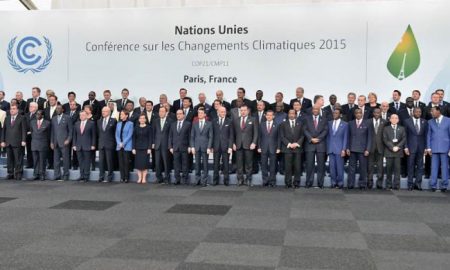
August 15, 2018 – It has been a while since my last climate change rant. But here goes.
In the absence of true climate change leadership from the nations which are the greatest contributors to anthropogenic climate change, the question I ask in the title of this posting is of great significance.
The Paris Climate Agreement of 2015 was a voluntary pact among the world’s nations to keep mean global temperatures from rising above 2.0 Celsius (3.6 Fahrenheit), and better yet to try for a lower target of 1.5 Celsius (2.4 Fahrenheit) as the maximum. The targets set had no time limit. They were like a baseball game played over nine innings to determine a winner, but if tied to be played on endlessly until one side won.
Without a full stop time limit, and with only voluntary commitment the Paris agreement was vitally flawed. No single nation was compelled to put a full stop on its contributions to rising global mean temperatures from carbon emissions.
If you didn’t know it I think everyone who reads this blog, and anyone who you may share it with, should know that we are approaching an increase of 1.0 Celsius (1.8 Fahrenheit) in global mean temperature over 1950 numbers. And the known correlation, rising carbon dioxide (CO2) in the atmosphere has now climbed past 410 parts per million versus 300 to 310 in 1950.
To date, no government or association of governments has stated “No more. Beyond this, we cannot allow.”
Why is that?
Because the entire approach to climate change has been loosey-goosey using free market principles and methods to make carbon emissions fall. We have carbon cap and trade. We have governments putting a price on carbon. We have public companies declaring the carbon cost of doing business. Countries have made individual pledges to reduce carbon emissions and implement more sustainable economic practices. But right now, even in the most committed of nations, using free market principles has failed to stem or reverse emissions.
I’m talking about Germany, a nation that has made the pledge, more than any other, to arrest global warming through carbon emission reductions. In the latest reports on Germany’s progress, it is falling well short of achieving greenhouse gas emission targets, primary energy consumption reductions, and increases in renewable energy infrastructure. Part of Germany’s problem is the government’s pledge to close all nuclear power plants after the Fukushima disaster in Japan. That has meant keeping coal-fired power plants open to make up for the shortfall in energy capacity. This is one of many decisions that has ensured that Germany, the most progressive state of any size in the fight to reduce carbon emissions, will not achieve any of its Paris voluntary pledges.
I have often advocated that the proper response to global warming is to make the equivalent to a Manhattan-Project-sized investment by the nations of the world to beat back the carbon emissions threat. The battle for the planet’s climate needs all nations on a wartime footing. In wartime free-market principles are put aside in organizing governments to educate citizens, implement programs, and spend money where it is needed to defeat the enemy.
That means:
- Intervening in the businesses of nations. It means capping fossil fuel production, accelerating alternative energy research and development, and rapid development of renewable energy projects and storage.
- Making dramatic investments in negative-emissions technology solutions and natural carbon sinks to suck carbon out of the atmosphere. For example, forest companies need to change their business paradigm by making money not cutting down forests but rather through reforestation.
- Ending subsidies to the fossil fuel industry now, not over a decade, but forthwith.
- No new fossil fuel development, period. No new oil sands projects here in Canada, no new pipelines, no new offshore gas and oil fields, no more fracking.
Governments have to think of this as war. They need to have the public behind them. The incremental strategies and gradualist approach, the voluntary commitments of Paris, none of this is working and won’t inevitably lead us to the desired targeted outcome.
And the Developed World governments that signed the Paris Agreement need to make good on helping the Developing World achieve economic viability without having to go through the highly polluting industrial progression that characterized the former’s economic growth.
Governments have to create a new transportation paradigm because next to energy production, transportation is the largest source of human-produced carbon emissions. That means putting the automobile industry on a war footing in a similar fashion to what happened in North America during World War II. What gets built from now on has to be low carbon.
Even carbon emissions related to what we grow and eat has to be reexamined. Governments need to promote green, sustainable agriculture. If it means fewer flatulent cows, then so be it.
In a war, every aspect of society and the economy must be geared to fight. And this is a different war, one humanity has never previously experienced. There is no human adversary in this conflict. It is we and our behaviours that are the enemy. That means we need to change.
What happens if governments are no longer willing to lead the fight? What if they continue to diddle around with market-tweaking policies to defeat carbon emissions? What if we exceed a 2.0 Celsius threshold? We will feel it to a degree, and may already be seeing evidence of it, but future generations will suffer far more because of our unwillingness to do the right things to stabilize the planet’s temperature and the biosphere we rely on to survive.









